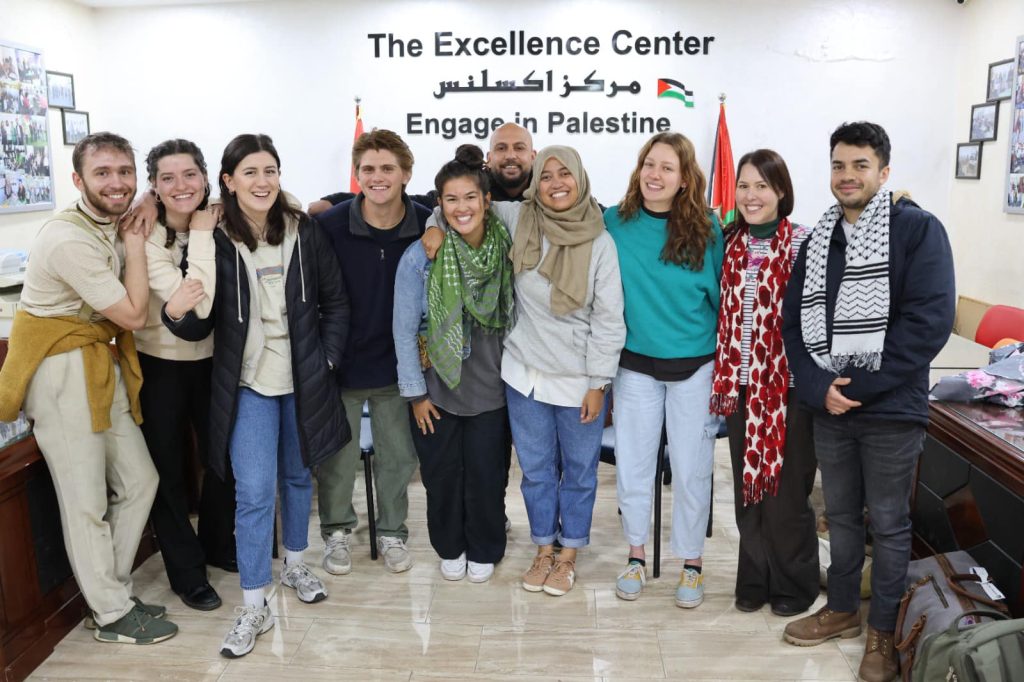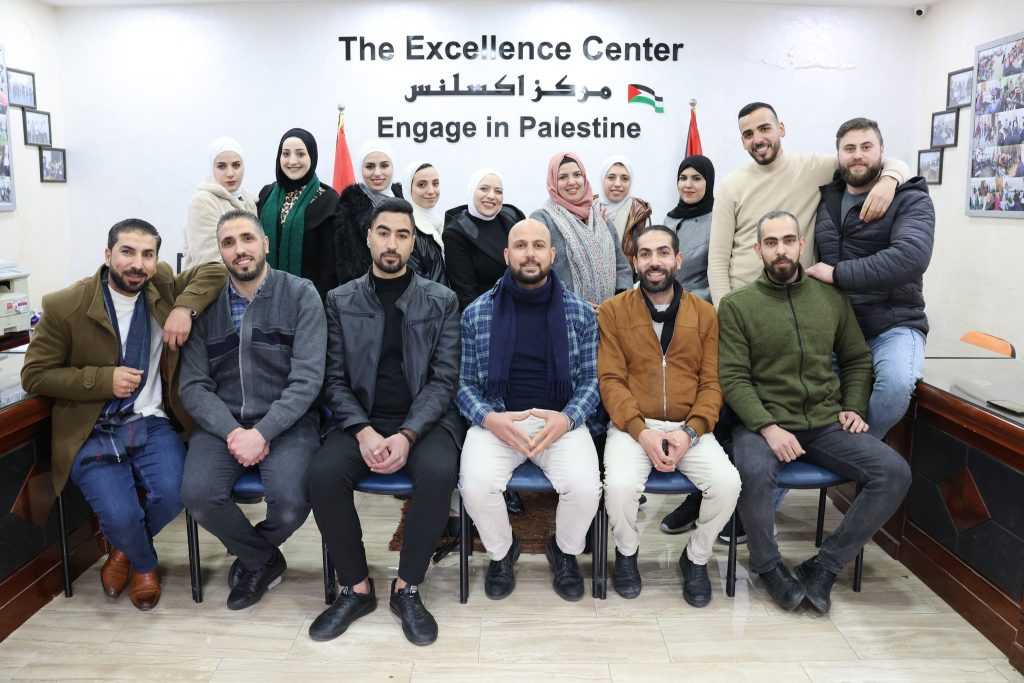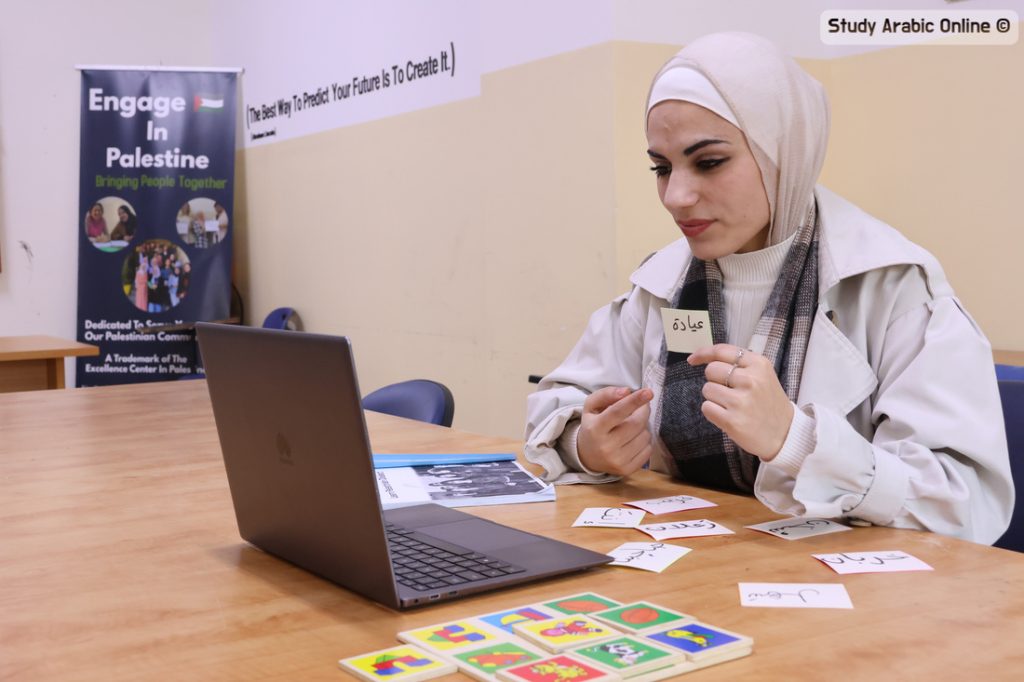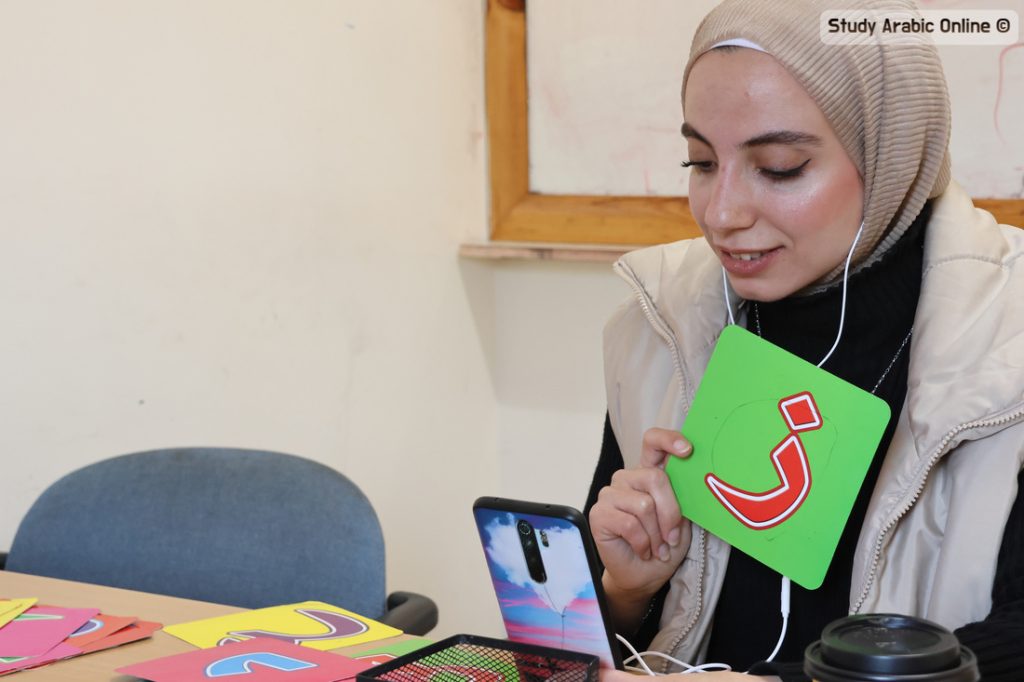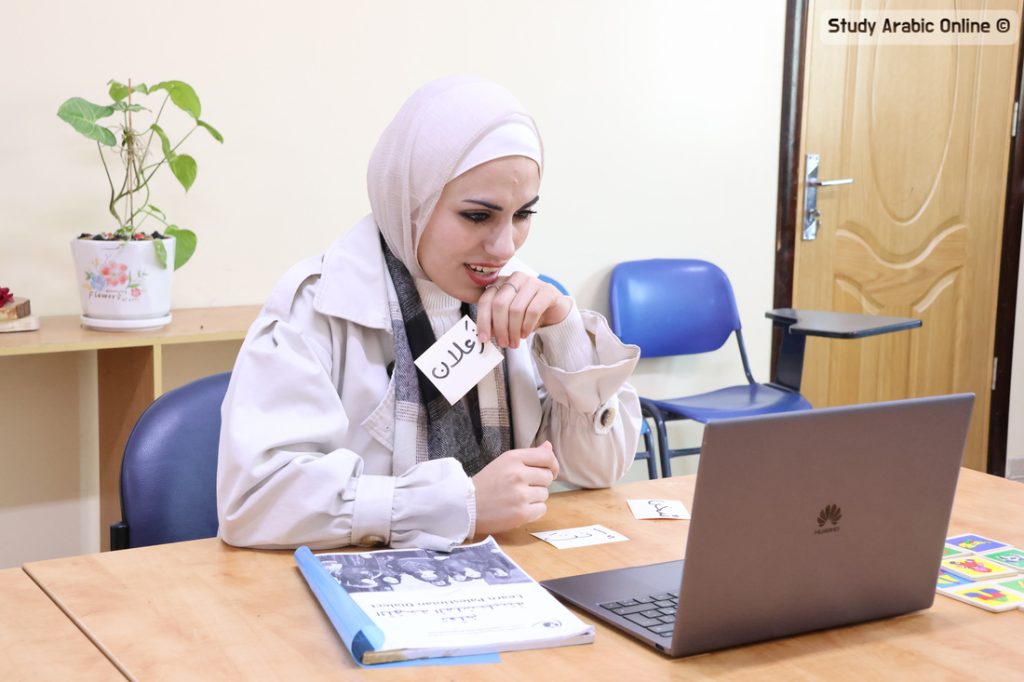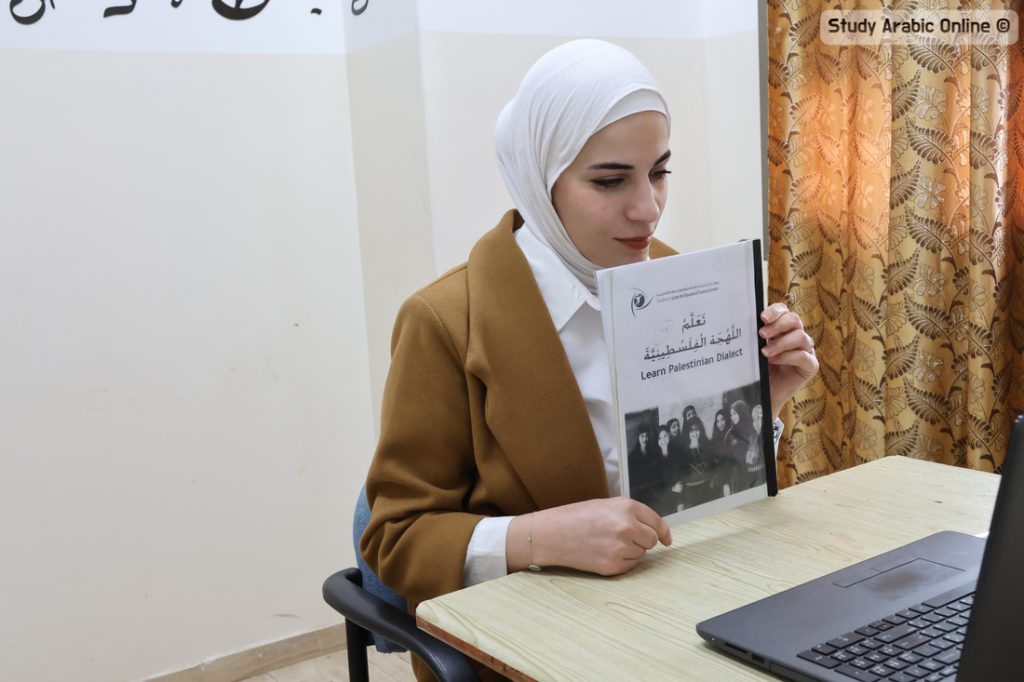-
Beginner Levantine Arabic Online Courses
Our Beginner Levantine Arabic Online Courses are designed for individuals who are starting their journey with the Arabic language. Whether you’re learning for travel, business, cultural immersion, or personal enrichment, […]
-
Top Online Programs for Palestinian Colloquial Arabic
Top Online Programs for Palestinian Colloquial Arabic: The Study Palestinian Arabic Program is a great opportunity for those wishing to learn the colloquial Palestinian dialect of Arabic, connect with the […]
Colloquial Arabic Online
Study Arabic Online Programs in 2025/2026
We are excited to announce that registration for the Study Arabic Online Programs for the academic year 2025/2026 is now open. These online programs offer a unique opportunity to learn Arabic with personalized instruction tailored to your needs.
Students can choose to focus on Levantine Arabic (Ammiyya), which includes dialects from Palestine, Jordan, Syria, and Lebanon, as well as Modern Standard Arabic (MSA) and Classical Arabic. Participants can expect to engage in 20 hours of instruction per week. This intensive format allows students to rapidly acquire Arabic skills, enabling them to complete a full 80-hour course in just four weeks.
Study Arabic Online
Study Palestinian Arabic Online in 2025/2026!
We are thrilled to announce the continuation of our Study Palestinian Arabic Online programs for the 2025/2026 academic year! Perfect for learners of all levels—beginner, intermediate, or advanced—our online courses offer the opportunity to master Palestinian Colloquial Arabic (Ammiya) from your home.
These flexible, interactive Palestinian Arabic lessons are designed to immerse you in the spoken language, focusing on practical communication, cultural insights, and everyday conversational skills. Taught by experienced Palestinian instructors, the program allows you to connect with Palestine’s vibrant culture, history, and traditions, no matter where you are.
Levantine (Shami Arabic)
Ammiyya Arabic Courses
Intensive online Arabic Programs
At Study Arabic Online, students can participate in intensive Arabic programs that offer up to 20 hours of study per week. This schedule promotes rapid progress in both Palestinian/Levantine dialects and Modern Standard Arabic (MSA).
With 20 Arabic hours of guided learning, you will develop a deep understanding of the language, improve your fluency, and quickly engage in real-life Arabic conversations. Whether your focus is on speaking or writing, our structured curriculum and experienced native instructors will help you make the most of your study time. Additionally, our flexible online platform allows you to learn at your own pace while still benefiting from personalized feedback and support.
Meet the Study Arabic Online Team
Osama Abu Hussein
Programs Coordinator
Osama Abu Hussein serves as the Programs Coordinator at Study Arabic Online, leveraging his expertise in media...
Muaz Alabaid
Arabic Teacher
Muaz Alabaid, a highly regarded Arabic teacher at Study Arabic Online, brings a wealth of experience to his ro...
Saja Amro
Arabic Teacher
Saja Amro, an enthusiastic Arabic teacher with Study Arabic Online, is known for her sociable nature and a gen...
Ibrahim Abueissheh
Arabic Teacher
Ibrahim Abueissheh holds a B.A. in English Teaching Methods from Hebron University. Currently employed as an E...
Duha Amro
Arabic Teacher
Duha Amro is a dedicated online Arabic teacher affiliated with Study Arabic Online. Armed with a B.A. in Engli...
Rafat Shantir
Founder
Rafat Shantir is the founder and driving force behind the Study Arabic Online Platform. Passionate about foste...
Join Our Online Arabic Language Courses
Our Reviews On GoAbroad
Get to Know Study Arabic Online
Welcome to Study Arabic Online, a learning platform based in Hebron, Palestine. Founded by young Palestinian educators, the platform offers high-quality instruction in both colloquial Palestinian Arabic (Levantine) and Modern Standard Arabic (MSA) for non-native speakers.
Our students come from various backgrounds, including journalists, academics, diplomats, NGO personnel, university students, and people of Palestinian and Arab origin, all eager to learn Arabic and explore Arab culture.
Study Arabic Online offers courses in Levantine Arabic (Ammiyya or Shami Arabic), which includes Palestinian, Jordanian, Syrian, Lebanese, and Egyptian dialects, as well as Modern Standard Arabic. Our programs are designed for beginners and focus on practical conversation and everyday vocabulary, making it easy to learn Arabic from the comfort of your home or workplace.
Ready to learn Arabic? Join our engaging online lessons taught by experienced instructors from Palestine, Jordan, Lebanon, Egypt, and Syria. Whether you’re a student, a professional, or just passionate about Arabic, our classes are designed for everyone. You’ll learn to speak Arabic confidently and connect with people from Arabic-speaking countries.
Whether you’re learning Arabic for the first time or already have some knowledge, our courses will help you prepare for interviews, language tests, and even work in Arabic-speaking countries.
Getting started is easy! Simply fill out the application form, and then enjoy a free trial lesson with your Arabic teacher. There’s no charge for this first class—no payment needed.
If you enjoy the lesson and feel comfortable with the teacher, you can sign up and choose the number of Arabic hours that suit you (from 10 to 100). We’ll provide all the books and resources to help you succeed!
Tailored Arabic Learning: Private Tutoring Online
If you want to make your learning more personal, you can get private tutoring with Study Arabic Online. It’s all done online, and you can choose to do it one-on-one or with a friend. This can be its own class or something you add to other classes you’re taking on the Study Online Platform.
You can focus on Modern Standard Arabic, Levantine Colloquial Arabic, or Classical Arabic, and the lessons will be made just for you based on what you like, how much you already know, and where you’re from. You can book these private lessons anytime during the year, and they don’t have to match up with the regular Study Arabic Online schedule.
Interactive and Structured
Our online Arabic courses are crafted with your enjoyment in mind, aiming to make learning Arabic a rewarding and fulfilling experience. We understand the importance of keeping you engaged and excited throughout your language journey.
That’s why our Arabic lessons are designed to be dynamic, interactive, and filled with activities that make learning fun. Whether you’re exploring new vocabulary, practicing conversation skills, or delving into Arabic culture, our goal is to ensure that every session leaves you feeling inspired and eager to continue your language-learning adventure
Practice
Our online Arabic programs offer a wide range of exercises designed to reinforce your learning at every level. These exercises provide valuable practice opportunities for the new words and phrases you acquire during your studies.
You’ll solidify your understanding and retention of the Arabic language by actively engaging with the material through various activities, such as vocabulary drills, sentence completion exercises, and role-playing scenarios. Our goal is to ensure that you not only learn Arabic but also develop the confidence and proficiency to use it effectively in real-life situations
Flexible Schedule
Understanding that adhering to a rigid schedule can be challenging, we’ve designed our Arabic lessons to be flexible and adaptable to your needs. Whether you’re juggling work, family, or other commitments, we strive to make learning convenient for you.
With the flexibility to choose your lesson times and adjust them as necessary, you can learn at your own pace and on your own terms. Our aim is to remove barriers to learning and provide you with the freedom to pursue your Arabic language goals in a way that fits seamlessly into your lifestyle.
Easy & Fun
Learning Palestinian or Levantine Arabic with us is a breeze, filled with joy and delight. We’re dedicated to making your language journey both enjoyable and lighthearted. Our approach focuses on creating a relaxed and positive learning environment where you can thrive and make meaningful progress in your Arabic skills. So, come join us and embark on a journey that’s not only educational but also full of fun and laughter!
Great Teachers
With over 13 years of experience teaching online Arabic lessons, our instructors are dedicated to helping you master the language. They’re not just teachers but also your friends, making your Arabic learning journey effective and enjoyable.
Search Our Website
Our Reviews & Awards
Private one-on-one courses
At Study Arabic Online, we specialize in providing personalized one-on-one Arabic lessons designed specifically for you.
Our online Arabic courses offer the flexibility to learn at your own pace, allowing you to progress according to your needs and goals.
Whether you’re looking to fit lessons into a busy schedule or take your time mastering the Arabic language, we make it easy to learn whenever and wherever suits you best.
Study Arabic Online
Study Arabic Online, founded by Palestinian youth from the West Bank, is focused on teaching Arabic language and culture.
We offer both intensive and regular online Arabic programs, with lessons for all levels, from beginners to advanced. No matter your level, our Arabic lessons are designed to fit your needs.
Jordanian/Palestinian Dialect
We want Arabic learners to enjoy a special experience by learning the Jordanian/Palestinian dialect from our native speakers. You’ll also gain insights into the Levant culture.
Our online Arabic classes are fun and interactive, and use the latest teaching technologies for learning languages.
Study Arabic With Us
Study Arabic Online is a language program dedicated to teaching Palestinian, Syrian, Jordanian, Lebanese, and Egyptian Arabic dialects, as well as Modern Standard Arabic. Our goal is to empower learners to communicate effectively in Arabic and engage with communities in the Middle East and around the Arabic-speaking world.
We strive to provide a distinctive learning experience by offering Arabic dialect lessons from our native speakers, providing valuable insights into Arabic culture. Our Arabic classes are designed to be communicative, interactive, and leverage the latest technologies in foreign language instruction.
Intensive Online courses
Ready to fast-track your Arabic learning? Enroll in our Intensive Online Arabic courses and dive into 20 hours of engaging instruction per week! In just four weeks, you’ll complete a full 80-hour course and make significant progress in Arabic.
Choose from a variety of options, including Modern Standard Arabic, Palestinian Arabic (Ammiyya), Egyptian Arabic, and Levantine Arabic (Shami Dialect) اللهجة الشامية.
Whether you’re aiming to speak fluently or understand the language better, our intensive courses are designed to help you achieve your goals quickly and effectively.
Levantine Arabic اللهجة العامية
Levantine Arabic, also known as Shami or Ammiyya (اللهجة العامية), is spoken in the Levant region, including Syria, Jordan, Lebanon, Palestine, and southern Turkey.
With over 54 million speakers, Levantine Arabic is one of the two main prestige dialects, alongside Egyptian Arabic, and is widely understood throughout the Arab world.
From Reader to Speaker
I’ve been learning Arabic for three years, but I struggled to speak despite having basic vocabulary. After starting online lessons with Duha, everything changed. She customized the lessons to fit my learning style, helping me overcome frustration and gain confidence in my progress.
I’m excited to continue and hope to study Arabic in Palestine soon. My advice to future learners is to stay a couple of pages ahead in your vocabulary book. The flexible scheduling, personalized approach, and excellent resources made this online Arabic course a perfect fit for me. Highly recommended! — Joost from the Netherlands
